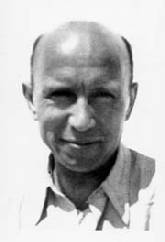Fritz Kolbe
| Fritz Kolbe | |
|---|---|

ca. 1946-47
|
|
| Born |
25 September 1900 Berlin, German Empire |
| Died | 16 February 1971 (aged 70) Bern, Switzerland |
| Organization | Foreign Office (Germany) |
| Movement | Allies |
Fritz Kolbe (September 25, 1900 – February 16, 1971) was a German diplomat who became a spy against the Nazis in World War II.
Kolbe was born on September 25, 1900 in Berlin to middle-class parents. His father was a saddle maker. Throughout his childhood he was influenced by his father's guidance to be courageous and "always do what he thought right" and the Wandervogel movement, which beginning in 1914 also helped to develop his principled conduct and integrity. Activities with the group of fellow middle-class people allowed him to get away from his family, enjoy nature, and engage in sports.
Kolbe was conscripted into the German army as a civilian worker in October 1917. He was assigned to a telegraph unit and then an engineer battalion between August 1918 and the end of the year. After the war he rejoined the Wandervogel movement. The post-World War I period saw the formation of up to 2,000 youth groups and organizations. These were generally opposed to the government and society of the Weimar Republic; many were subsequently absorbed into the Hitler Youth, but the Wandervogel remained anti-Nazi.
Beginning in 1919, while working at the German State Railways as an apprentice, Kolbe completed his high school education and began his four-year economics education at the University of Berlin. He became the youngest stationmaster for the railway after he passed a civil service exam in 1922. Interested in traveling outside of Germany, Kolbe took the foreign service examinations in 1925 and passed.
He was employed by the German foreign ministry in March 1925 as a clerk. In October of that year he was posted as a mid-level diplomat in Madrid until January 1936. After Madrid, Kolbe was briefly stationed in Warsaw before returning in mid-1936 to Berlin to take care of his dying wife. He then worked for Rudolph Leitner and, with him, was posted in the Cape Town German consulate in 1937. While in South Africa he socialized with people who, like him, were anti-Nazi, and he was interviewed by Nazi party chiefs who deemed him a "hopeless" Nazi party member.
Kolbe's refusal to join the Nazi Party led him to be assigned lowly clerical work in Berlin after the start of World War II in 1939. By 1941, Joachim von Ribbentrop was the Foreign Minister. He nearly quadrupled the size of the foreign ministry to over 10,000 workers. Many were Nazi party members brought in by Ribbentrop to increase motivation to execute Hitler's endeavors.
...
Wikipedia
